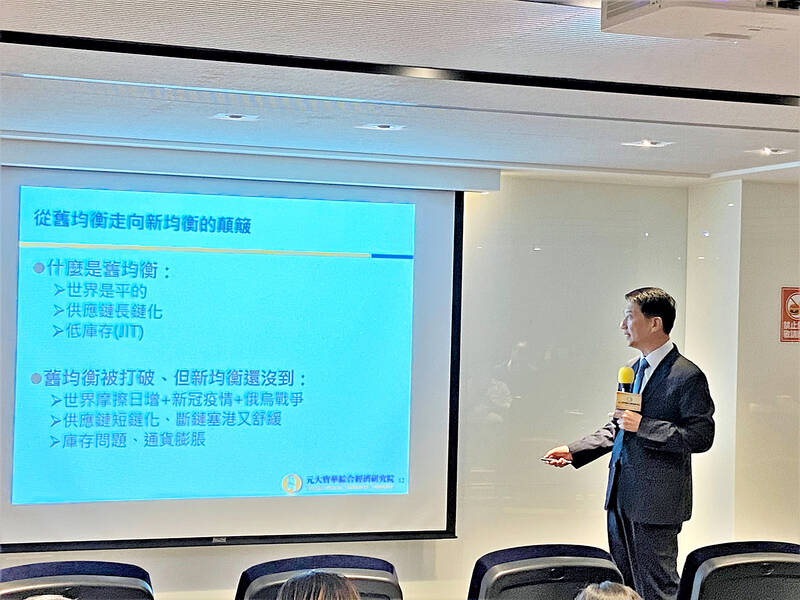Taiwan’s economy would expand 3.4 percent this year as it slows down from last year’s COVID-19 pandemic-induced boom while keeping in line with historic trends, the Yuanta-Polaris Research Institute (元大寶華綜經院) said yesterday.
Ongoing inventory corrections are caused by overbooking during COVID-19 lockdowns, rather than a decline in global demand for goods and services, institute president Charles Yeh (葉銀華) said.
The corrections could end in the first quarter of next year, Yeh said.

Photo: Huang Tzu-hsun, Taipei Times
“Taiwan’s GDP would put up a normal, acceptable growth of 3.4 percent this year, compared with a 12-year-high of 6.57 percent last year,” as COVID-19-induced demand for remote working and learning wanes, he said.
As local manufacturers would need four quarters to digest excess inventory, Taiwan’s economic growth would weaken to 2.75 percent next quarter and 1.65 percent in the first quarter of next year before bouncing back, Yeh said.
Exports of non-tech products slipped into the contraction zone last month and might encounter further headwinds as central banks tighten their monetary policies to curb inflation, he added.
The scenario would allow domestic demand to replace exports as the main growth driver, the institute said.
Private investment is expected to increase 6.89 percent this year, propped up by robust global demand for chips used in smartphones, laptops, vehicles, data centers, and artificial intelligence and Internet of Things applications, it said.
Private consumption would rise 3.19 percent this year, with an expected gain of 6.51 percent this quarter and 2.95 percent in the fourth quarter, the institute said.
The projection assumes consumer spending returning to pre-pandemic levels — with people becoming used to living with the virus and authorities gradually lifting disease control measures, it said.
Inflationary pressures, a key threat to consumer spending, would climb 2.94 percent this year, suggesting a 3.01 percent pickup this quarter and a 2.49 percent rise in the fourth quarter, it said.
Consumer prices would soften below the 2 percent alert level to 1.69 percent next year, it said.
The forecast assumes the central bank would raise interest rates by another 0.125 percentage points today to tame inflation, much lower than the US Federal Reserve’s 0.75 percentage point rate hike, Yeh said.
Capital flight would persist as portfolio managers at home and abroad respond to Taiwan’s widening rate gap with the US, he said.
The local bourse and the New Taiwan dollar would be affected amid fund redeployment, he added.
The capital movements would not become uncontrollable and could turn around in the coming six months, Yeh said.

CHIP RACE: Three years of overbroad export controls drove foreign competitors to pursue their own AI chips, and ‘cost US taxpayers billions of dollars,’ Nvidia said China has figured out the US strategy for allowing it to buy Nvidia Corp’s H200s and is rejecting the artificial intelligence (AI) chip in favor of domestically developed semiconductors, White House AI adviser David Sacks said, citing news reports. US President Donald Trump on Monday said that he would allow shipments of Nvidia’s H200 chips to China, part of an administration effort backed by Sacks to challenge Chinese tech champions such as Huawei Technologies Co (華為) by bringing US competition to their home market. On Friday, Sacks signaled that he was uncertain about whether that approach would work. “They’re rejecting our chips,” Sacks

NATIONAL SECURITY: Intel’s testing of ACM tools despite US government control ‘highlights egregious gaps in US technology protection policies,’ a former official said Chipmaker Intel Corp has tested chipmaking tools this year from a toolmaker with deep roots in China and two overseas units that were targeted by US sanctions, according to two sources with direct knowledge of the matter. Intel, which fended off calls for its CEO’s resignation from US President Donald Trump in August over his alleged ties to China, got the tools from ACM Research Inc, a Fremont, California-based producer of chipmaking equipment. Two of ACM’s units, based in Shanghai and South Korea, were among a number of firms barred last year from receiving US technology over claims they have

It is challenging to build infrastructure in much of Europe. Constrained budgets and polarized politics tend to undermine long-term projects, forcing officials to react to emergencies rather than plan for the future. Not in Austria. Today, the country is to officially open its Koralmbahn tunnel, the 5.9 billion euro (US$6.9 billion) centerpiece of a groundbreaking new railway that will eventually run from Poland’s Baltic coast to the Adriatic Sea, transforming travel within Austria and positioning the Alpine nation at the forefront of logistics in Europe. “It is Austria’s biggest socio-economic experiment in over a century,” said Eric Kirschner, an economist at Graz-based Joanneum

France is developing domestic production of electric vehicle (EV) batteries with an eye on industrial independence, but Asian experts are proving key in launching operations. In the Verkor factory outside the northern city of Dunkirk, which was inaugurated on Thursday, foreign specialists, notably from South Korea and Malaysia, are training the local staff. Verkor is the third battery gigafactory to open in northern France in a region that has become known as “Battery Valley.” At the Automotive Energy Supply Corp (AESC) factory near the city of Douai, where production has been under way for several months, Chinese engineers and technicians supervise French recruits. “They